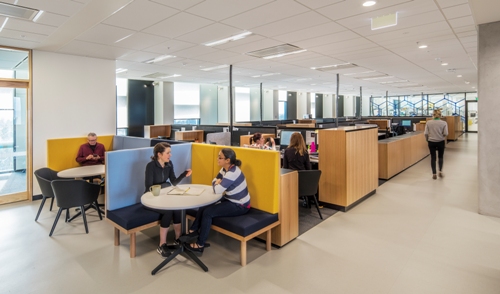 As nations and organizations construct future working approaches, many assume that the use of the “new ways of working” that had accelerated during the pandemic will continue. The forward planning assumes that workplaces changes in terms of increased flexibility in time and place of work will be good for both employee and organisational performance. However, research evidence suggests a trade-off between changes in organizational productivity and employee wellbeing, as a result of declining management trust and employee commitment. Now is the time to investigate ways to optimize future workplaces for sustaining employee wellbeing and organisational commitment as well as organisational productivity.
As nations and organizations construct future working approaches, many assume that the use of the “new ways of working” that had accelerated during the pandemic will continue. The forward planning assumes that workplaces changes in terms of increased flexibility in time and place of work will be good for both employee and organisational performance. However, research evidence suggests a trade-off between changes in organizational productivity and employee wellbeing, as a result of declining management trust and employee commitment. Now is the time to investigate ways to optimize future workplaces for sustaining employee wellbeing and organisational commitment as well as organisational productivity.
The Future Workplace project focuses on those “new ways of working” that involve changes to the physical and social environment, through changes to infrastructure as well as increased use of remote and geographically distributed working, flexible timing and continuity of work, and creating different place and time that might traditionally have been non-work and/or personal times and spaces for work.
The project team aims to work with larger firms to examine the impact of the workplace design (when, where and how work is undertaken) on individual discretionary performance and team engagement. We are interested in investigating the “above and beyond” activities that allow groups and teams to get more done, more effectively and efficiently, while building management trust and employee commitment, as well as understanding how homes as workplaces may have different impacts on employees’ work-life balance.
Objectives include:
- Establishing a clear measurement framework for workplace: the individual employee’s time, space, and place of work, as well as the degree of autonomy afforded workers on matters of time and place.
- Investigating the influence of the workplace and ‘hybrid’ work on work-based social exchange, including with supervisors/leaders-members exchange (LMX) and group/team exchange, and
- Investigating the influence of different types of exchange, and the demands and resources of the workplace on employees’ discretionary effort, performance and engagement with their work and their organisation.
The team
The research project is led by Professor Marie Wilson, a specialist in Organisational Behaviour and Organisational Development, and conducted by a team of multidisciplinary experts in the field of:
- Human resource management (A/Prof. Connie Zheng – UniSA Business);
- Workplace psychosocial safety climate (Dr Ali Afsharian, UniSA Justice & Society);
- Workplace design and psychological reactions (Dr Libby Sanders from Bond University); and
- An external industry advisor with IT transformation expertise (Ms Lauren Pittwood).
Five HDR students have been recruited to work on several interrelated projects below to address future of work challenges and opportunities:
- Flexible work arrangement, caring responsibility, and work outcomes (Sasuli Vidana)
- Work from home, job autonomy & team dynamics (Rushna Preena)
- Flexibility policy, managerial practice, and employee discretionary effort (Karolina Ignatovich)
- Design aesthetics, psychological reactions, and organizations outcomes (Melissa Henschke)
- Hybrid working arrangements for early career knowledge workers (Maddy Dow)
The impact
The Future Workplace researchers will generate insights and knowledge in partnership with sponsoring firms to inform employees and employers alike in developing better solutions to address ‘future of work’ challenges and opportunities.
The expected research outputs will help promote a productive and meaningful workplace and support employee wellbeing and work-life balance, which are essential foundations for thriving people, sustainable high-performance organisations and healthy economies and societies.
Please contact Prof. Marie Wilson on marie.wilson@unisa.edu.au for further information.


